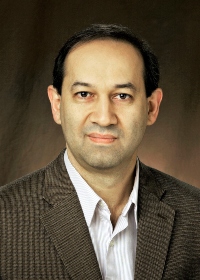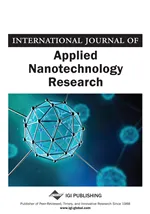 Dr. Rasulev (North Dakota State University, USA
Dr. Rasulev (North Dakota State University, USAEditor's Note: Interested in submitting to this scholarly journal?
IGI Global is waiving OA APCs through July 2020 when your work is submitted and accepted (following peer review) to IJANR. View additional details below.
The scope of nanotechnology research is utilized in many parts of everyday life, including medicine, environmental science, manufacturing and machine learning, and more. These applications touch on the everyday lives of human beings, as even with the COVID-19 pandemic, nanotechnology is playing a critical role in vaccine design. Considering the expansive reach of nanotechnology in society, the need for research on this topic continues to grow. The International Journal of Applied Nanotechnology Research (IJANR) (IGI Global) publishes key research that addresses the science and technology of nanosized and micro-sized materials, including synthesis, characterization and applications in various areas of human life to add to this highly needed body of research. To learn more about this publication, read the IGI Global interview below with IJANR Editor-in-Chief, Dr. Bakhtiyor Rasulev, from North Dakota State University, USA.
What inspired you to pursue research activities in nanotechnology?
In 2008, I was a postdoctoral researcher at the Computational Center for Molecular Structure and Interactions (CCMSI) in Mississippi. My supervisor, Prof. Jerzy Leszczynski, a U.S. President Distinguished Fellow in 2010, had an idea to establish a Nanotechnology Center and he encouraged me to come up with ideas on how we can use our computational chemistry expertise to deal with nanomaterials. Several researchers contributed their ideas to create an interdisciplinary project and it ended up establishing a large Interdisciplinary Center for Nanotoxicity (ICN) with multi-million-dollar funding from the National Science Foundation. Within the newly established center, it was very interesting to discover peculiar ways to investigate properties of nanomaterials while applying our computational techniques and developing new approaches.
Why are your respective areas of research important to the field at large?
I was one of the first researchers who started to apply cheminformatics methods to a new field – nanotechnology – trying to assess nanomaterials properties and toxicity using computational and chemometrics methods. My first study, which was in collaboration with other researchers, was a breakthrough study published in 2011 in a top journal in the field – Nature Nanotechnology. In this work, our group at the Interdisciplinary Center for Nanotoxicity in Jackson, Mississippi, USA was able to develop a predictive model (so-called “nano-QSAR” model) to assess the toxicity of metal oxide nanomaterials, which was the first of its kind. This study was a main study that broke the deadlock of cheminformatics-based structure-activity studies for nanomaterials. In the following years, I continued working in this direction with my colleagues and made several other breakthrough studies in this field, implementing new approaches in the prediction of nanomaterials’ toxicity and physicochemical properties. Now, based on these studies, one can easily estimate the toxicity of particular metal-based nanomaterial before synthesis and mass production.
In your opinion, what are some of the benefits of your research to its community of users?
Implementation of all these new machine learning-based nano-QSAR methods in the prediction of nanomaterials properties and especially toxicity of nanomaterials is going to bring substantial benefits to human lives by reducing the manufacturing of certain nanomaterials which are predicted to be highly toxic in short, and especially, long term. These newly developed methods are very helpful in estimation of the environmental impact of nanomaterials before their mass production, which can save lives and improve the quality of life, by applying “safe-by-design” approaches based on the developed methods (i.e. development of highly functional nanomaterials with low toxicity).
What are the future directions of your research areas?
The future directions of my research are development of artificial intelligence (AI)-based predictive models to design novel nanomaterials and bio-based polymeric materials. This research is based on an interdisciplinary combination of several approaches – computational chemistry, machine learning, and cheminformatics methods for modeling, data analysis, and development of predictive structure-property relationship models. I am also involved in the development of a materials database, which will be useful in designing new polymeric materials and nanomaterials, as well as assist in the prediction of various properties, including toxicity and biodegradation of materials, which is important for life cycle assessment.
What are some other evolving research trends you have observed in your industry/field over the past several months and what would you say are some of the innovative research directions you foresee in the future? How do you feel your publication sets the pace for these innovations?
This is a very interesting question. I think the main research trend in my field is tremendous development of artificial intelligence (AI) methods which can dramatically accelerate our scientific developments and especially highly efficient functional materials development. Thus, the Materials Genome Initiative, which was launched in 2011 by the U.S. Federal Government, had the intention to accelerate the material discovery process and to scale them up. The application of AI methods in the materials field can dramatically speed-up the discovery process, which is directly in line with the Materials Genome Initiative. For example, AI can be applied in high throughput algorithms, in both the theoretical and experimental modeling, in development of accessible libraries and materials databases, and most importantly, in smart additive manufacturing.
IGI Global would like to thank Dr. Rasulev for sharing his research. For more information about this research, view the publication here, or view the information below.
IJANR's Description
The International Journal of Applied Nanotechnology Research (IJANR) publishes key research that addresses the science and technology of nanosized and micro-sized materials, including synthesis, characterization and applications in various areas of human life. The scope of the journal is very interdisciplinary and covers research related to chemistry, physics, biology, engineering, computer science, medicine and environmental related issues and applications. Focusing on both theoretical and experimental research in nanotechnology, this journal is an ideal reference source for various professionals in the field, including chemists, engineers, biologists, medical and pharmaceutical professionals, environmental scientists, academics, and upper-level students.
IJANR's Mission and Scope
The mission of the IJANR is to promote innovative research in nanotechnology, green and sustainable manufacturing, positive human health, including environmental well-being, better diagnosis and treatments in medicine, and improving the life and natural biological structure and function of humans through new knowledge discovery in the field of micro-scale and nano-scale technology and science. IJANR aims to advance the available research in this field and also enable future research developments.
OA APCs Waived for IJANR Through July 2020
Understanding limited budgets for researchers to publish their work under open access, IGI Global is waiving OA APCs for article manuscripts submitted and accepted (following peer review) to the International Journal of Applied Nanotechnology Research (IJANR) through July 31, 2020 (our APC fee for OA journal articles is normally $2,000 USD). Be sure to submit to take advantage of this offer or share this information with your networks to enable them to increase the exposure of their research.

Available in print and electronic format, IJANR is available at an automatic 50% discount* on the 2021 e-journal subscription through IGI Global’s Online Bookstore as well as all major subscription services through December 31, 2020. This discount applies to all of IGI Global's individual 2021 e-journal subscriptions. Additionally, all of IGI Global's publications are available on the article and chapter level through our OnDemand feature for as low as US$ 30. This publication is also available in IGI Global’s InfoSci-Journals, a database containing 27,000+ peer-reviewed journal articles with 1,000,000+ citation references, sourced from IGI Global’s scholarly journal collection.
Visit the publication’s webpage to subscribe, or contact Customer Service at cust@igi-global.com or 717-533-8845 ext. 100 or your preferred subscription agency with questions. For researchers, be sure to recommend this publication or the InfoSci-Journals database to your library to have access to this critical content.
About Dr. Rasulev: Dr. Bakhtiyor Rasulev is a professor at Department of Coatings and Polymeric Materials (North Dakota State University). He received his PhD degree in Chemistry in 2002 from Uzbek Academy of Sciences. Dr. Rasulev's scientific interests are in machine learning-based cheminformatics and structure-activity relationship studies, dealing with biological activity prediction, physico-chemical and toxicity prediction of chemicals, including nanoparticles and polymers. He is an author of many contributions devoted to nanomaterials and polymeric materials, cheminformatics modeling and quantum-chemical applications. Dr. Rasulev has close collaboration with the Jackson State University (USA), University of Zagreb (Croatia), National Institute of Chemistry (Slovenia), University of Gdansk (Poland), Instituto di Ricerche Farmacologiche Mario Negri (Italy), Johns Hopkins University (USA) and etc. His accomplishments have been widely recognized. He is a permanent reviewer of more than 20 peer-reviewed journals. Dr. Rasulev has received many scholarships and awards, including Scholarship of Drew University (Residential School of Medicinal Chemistry, Madison, NJ), Young Investigators Award from Toxicological Division of ACS, award from CRDF Foundation, UNESCO Scholarship to visit the Institute of Desert Study of Ben-Gurion University (Israel).
For your reference, find below a sample of related titles, which are also featured in IGI Global’s InfoSci-Journals database and are available in print and electronic format. Be sure to recommend these titles to your librarian, to ensure your institution can acquire the most emerging research.
Disclaimer: The opinions expressed in this article are the author’s own and do not reflect the views of IGI Global.
About IGI Global: Founded in 1988, IGI Global, an international academic publisher, is committed to producing the highest quality research (as an active full member of the Committee on Publication Ethics “COPE”) and ensuring the timely dissemination of innovative research findings through an expeditious and technologically advanced publishing processes. Through their commitment to supporting the research community ahead of profitability, and taking a chance on virtually untapped topic coverage, IGI Global has been able to collaborate with over 100,000+ researchers from some of the most prominent research institutions around the world to publish the most emerging, peer-reviewed research across 350+ topics in 11 subject areas including business, computer science, education, engineering, social sciences, and more. To learn more about IGI Global, click here.
Newsroom Contact
Caroline Campbell
Marketing Manager
ccampbell@igi-global.com
(717) 533-8845, ext. 144
www.igi-global.com/
*E-journals are hosted on IGI Global’s InfoSci® platform and available for PDF and/or ePUB download on a perpetual or subscription basis. This discount cannot be combined with any other discount or promotional offer. Offer expires December 31, 2020.